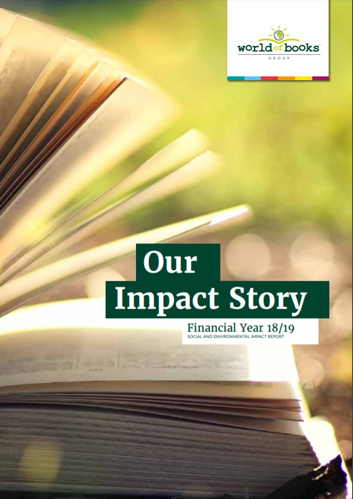Magic of Circular
The Magic of Circular
We don’t believe that books should only be read once, or have a single owner; this underpins everything we do. We want to share the love of literature by rereading and reusing books. Finding books new homes so they can be reread, turning books into something new - we see this as the magic of the circular economy.
We see the value in used books; in the joy they can bring, in knowledge they contain, in the paper of their pages. Our customers understand this too, they love books, reading and literature and don’t want to see old books go to waste. That is how books come to us, through individuals donating their books to charity shops or selling them to us through Ziffit, so someone else can enjoy them.
Charities understand the value of books too, used book sales help them to carry out their good work. We are proud to be able to support that by buying surplus books from them, removing waste costs from books and providing software so charities can sell more themselves.
We also understand that creating a product has an impact on the environment, and reusing a book has a positive impact. It uses less energy and fewer resources to reuse than produce and we close the loop so more books can find a new home.
But we want to do more, and have made three ambitious pledges to guide us to 2020:

Our pledges: 30% reduction in carbon by 2020
Protecting the planet is part of our purpose. Climate change is a real and imminent threat to our planet so we are taking action to reduce our carbon footprint.
Our business saves carbon emissions by keeping books in use for longer and recycling them properly. The more we grow, the greater the positive impact we can have. We estimate we saved over 1,600 tonnes CO2e through our operations in our 2018 financial year.

But we want to go further and have pledged to reduce our operational carbon footprint by 30% by 2020 (based on 2017 base line).

Carbon Footprint
Our carbon footprint was 8,504 tonnes CO2e in 2018, this includes emissions arising from our operations, third party distribution and recycling. This is a 9.5% increase on 2017, mainly due to an increase in the books we handle and sell, and a subsequent increase in distribution activities. Looking at our carbon intensity, this remained at 0.25 tonnes CO2e/tonne of book processed in both 2017 and 2018.

We actively measure and monitor our group carbon footprint, so that we can validate our energy consumption, identify areas for improvement and continually make efficiencies.
To help reach our target, we have begun sourcing our electricity and gas from a green energy supplier to reduce our carbon footprint. Our new facility in Coventry will help us increase efficiency. This new warehouse will provide greater automation and efficiency. This is a testing ground and, if successful, these new ways of working may be transferred to our other sites.
1 million fewer miles travelled
Transport, primarily to collect books from charity shops and other supply partners, contributes 24% of our carbon footprint.
To reduce this impact we have pledged to travel 1 million fewer collection miles by 2020. Smart routing technology is helping us plan collections better, making them more efficient. Having a warehouse in Coventry will also help. It will provide a more central location for some collections which will reduce the number of miles we need to travel. Fleet upgrades and driver training are also creating efficiencies in our book collections.

Distribution
Sending books to their new homes also makes a significant contribution to our carbon footprint. We estimate that distribution contributed 5,483 tonnes CO2e or 64% of our total carbon footprint in our 2018 financial year*. This remains a challenge, especially as we are World of Books; we have delivered books to nearly every country and around 30% of our books go overseas. International sales are also a key growth area for our business. We will continue to look for way to reduce emissions from distribution.
* Based on spend and UK Government GHG Conversion Factors for Company Reporting 2016
Case Study
We are keen to reduce the environmental impact of our operations where we can. Many of the technologies we have included at Coventry to save energy and water have also been rolled out to our other sites.
These include: recycling stations at all sites, waterless urinals and stop taps to reduce water use, electric charge parking points, more efficient heating systems and film on windows to help keep work spaces at the right temperature. We have replaced our LPG forklift trucks with new lithium ion forklifts, which are more efficient and save us money.
Download the World of Books Group Impact Report, FY18/19 by clicking on the image below:
